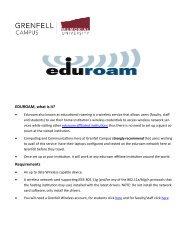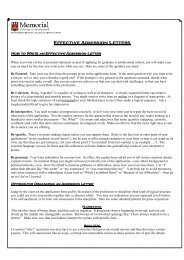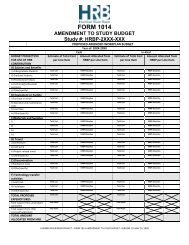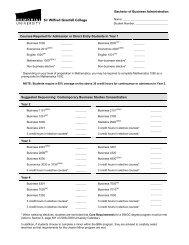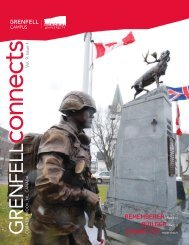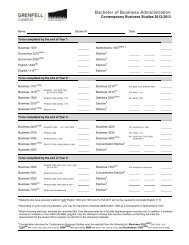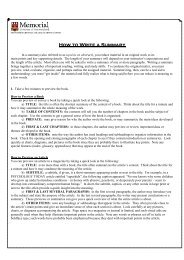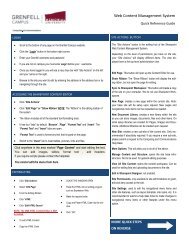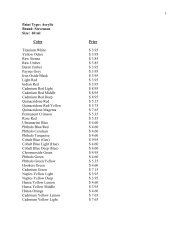General Questions for the Analysis & Evaluation of Short Stories and ...
General Questions for the Analysis & Evaluation of Short Stories and ...
General Questions for the Analysis & Evaluation of Short Stories and ...
Create successful ePaper yourself
Turn your PDF publications into a flip-book with our unique Google optimized e-Paper software.
SIR WILFRED GRENFELL COLLEGE LEARNING CENTRE<br />
<strong>General</strong> <strong>Questions</strong> <strong>for</strong> <strong>the</strong> <strong>Analysis</strong> & <strong>Evaluation</strong> <strong>of</strong> <strong>Short</strong><br />
<strong>Stories</strong> <strong>and</strong> Novels<br />
PLOT<br />
1. Who is <strong>the</strong> Protagonist <strong>of</strong> <strong>the</strong> story? What are <strong>the</strong> conflicts? Are <strong>the</strong>y physical, intellectual, moral or<br />
emotional? Is <strong>the</strong> main conflict between good <strong>and</strong> evil sharply differentiated, or is it more subtle <strong>and</strong> complex?<br />
2. Does <strong>the</strong> plot have unity? Are all <strong>the</strong> episodes relevant to <strong>the</strong> total meaning or effect <strong>of</strong> <strong>the</strong> story? Does<br />
each incident grow logically out <strong>of</strong> <strong>the</strong> preceding incident <strong>and</strong> lead naturally to <strong>the</strong> next? Is <strong>the</strong> ending happy,<br />
unhappy, or undetermined? Is it fairly achieved?<br />
3. What use does <strong>the</strong> story make <strong>of</strong> chance <strong>and</strong> coincidence? Are <strong>the</strong>se occurrences used to initiate, to<br />
complicate, or to resolve <strong>the</strong> story? How improbable are <strong>the</strong>y?<br />
4. How is <strong>the</strong> suspense created in <strong>the</strong> story? Is <strong>the</strong> interest confined to examples <strong>of</strong> mystery? <strong>of</strong> dilemma?<br />
5. What use does <strong>the</strong> story make <strong>of</strong> surprise? Are <strong>the</strong> surprises achieved fairly? Do <strong>the</strong>y serve a significant<br />
purpose? Do <strong>the</strong>y divert <strong>the</strong> reader’s attention from weakness in <strong>the</strong> story?<br />
6. To what extent is this a “<strong>for</strong>mula” story?<br />
CHARACTERS<br />
1. What means does <strong>the</strong> author use to reveal characters? Are <strong>the</strong> characters sufficiently dramatized? What use<br />
is made <strong>of</strong> character contrast?<br />
2. Are <strong>the</strong> characters consistent in <strong>the</strong>ir actions? adequately motivated? plausible? Does <strong>the</strong> author<br />
successfully avoid stock characters?<br />
3. Is each character developed enough to justify his role in <strong>the</strong> story? Are <strong>the</strong> main characters round or flat?<br />
4. Are any <strong>of</strong> <strong>the</strong> characters a developing character? If so, is his/her change a large or small one? Is it a<br />
plausible change <strong>for</strong> him/her? Is he/she sufficiently motivated? Is she/he given sufficient time?<br />
THEME<br />
1. Does <strong>the</strong> story have a <strong>the</strong>me? What is it? Is it implicit or explicit?<br />
2. Does <strong>the</strong> <strong>the</strong>me rein<strong>for</strong>ce or oppose popular notions <strong>of</strong> life? Does it furnish a new insight or refresh or<br />
deepen an old one?<br />
POINT OF VIEW<br />
1. What point <strong>of</strong> view does <strong>the</strong> story use? Is it consistent in its use <strong>of</strong> this point <strong>of</strong> view? If shifts are made, are<br />
<strong>the</strong>y justified?<br />
2. What are <strong>the</strong> advantages <strong>of</strong> <strong>the</strong> chosen point <strong>of</strong> view? Does it furnish any clues as to <strong>the</strong> purpose <strong>of</strong> <strong>the</strong><br />
story?<br />
3. If <strong>the</strong> point <strong>of</strong> view is that <strong>of</strong> one <strong>of</strong> <strong>the</strong> characters, does this character have any limitations that affect his/her<br />
interpretation <strong>of</strong> events or persons?<br />
4. Does <strong>the</strong> author use point <strong>of</strong> view primarily to reveal or conceal? Does he/she unfairly withhold important<br />
in<strong>for</strong>mation known to <strong>the</strong> focal character?
<strong>General</strong> <strong>Questions</strong> <strong>for</strong> <strong>the</strong> <strong>Analysis</strong> & <strong>Evaluation</strong> <strong>of</strong> <strong>Short</strong><br />
<strong>Stories</strong> <strong>and</strong> Novels (cont.)<br />
SYMBOLISM AND IRONY<br />
1. Does <strong>the</strong> meaning <strong>of</strong> <strong>the</strong> story make use <strong>of</strong> symbols? If so, do <strong>the</strong> symbols carry or merely rein<strong>for</strong>ce <strong>the</strong><br />
meaning <strong>of</strong> <strong>the</strong> story?<br />
2. Does <strong>the</strong> story utilize irony <strong>of</strong> situation? dramatic irony? verbal irony? What functions do <strong>the</strong> ironies<br />
serve?<br />
EMOTION AND HUMOUR<br />
1. Does <strong>the</strong> story aim directly at an emotional effect, or is emotion merely its natural by-product?<br />
2. Is <strong>the</strong> emotion sufficiently dramatized? Is <strong>the</strong> author anywhere guilty <strong>of</strong> sentimentality?<br />
FANTASY<br />
1. Does <strong>the</strong> story employ fantasy? If so, what is <strong>the</strong> initial assumption? Does <strong>the</strong> story operate logically from<br />
this assumption?<br />
2. Is <strong>the</strong> fantasy employed <strong>for</strong> its own sake, or to express some human truth? If <strong>the</strong> latter, what truth?<br />
GENERAL<br />
1. Is <strong>the</strong> primary interest <strong>of</strong> <strong>the</strong> story in <strong>the</strong> plot, character, <strong>the</strong>me, or some o<strong>the</strong>r element?<br />
2. What contribution to <strong>the</strong> story is made by <strong>the</strong> setting? Is <strong>the</strong> particular setting essential, or could <strong>the</strong> story<br />
have happened anywhere?<br />
3. What are <strong>the</strong> characteristics <strong>of</strong> <strong>the</strong> author’s style? Are <strong>the</strong>y appropriate to <strong>the</strong> nature <strong>of</strong> <strong>the</strong> story?<br />
4. What light is thrown on <strong>the</strong> story by its title?<br />
5. Do all <strong>the</strong> elements <strong>of</strong> <strong>the</strong> story work toge<strong>the</strong>r to support <strong>the</strong> central purpose? Is any part irrelevant or<br />
inappropriate?<br />
6. What do you conceive to be <strong>the</strong> story’s central purpose? How fully has <strong>the</strong> story achieved that purpose?<br />
7. Does <strong>the</strong> story chiefly <strong>of</strong>fer escape or does it have greater significance? How l<strong>of</strong>ty is <strong>the</strong> story’s purpose?<br />
8. Does <strong>the</strong> story gain or lose on a second reading?<br />
This in<strong>for</strong>mation has been compiled <strong>and</strong>/or adapted by <strong>the</strong> Learning Centre. Please Drop by AS 234 <strong>and</strong> meet <strong>the</strong> assistants.<br />
Revised 2004




